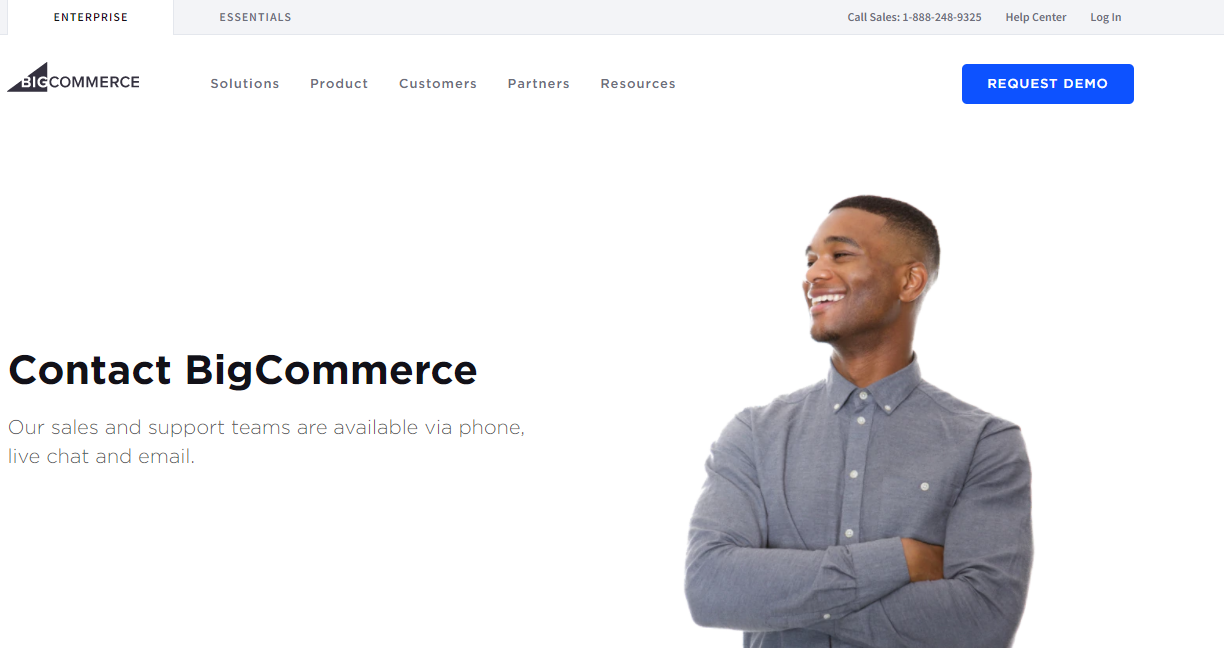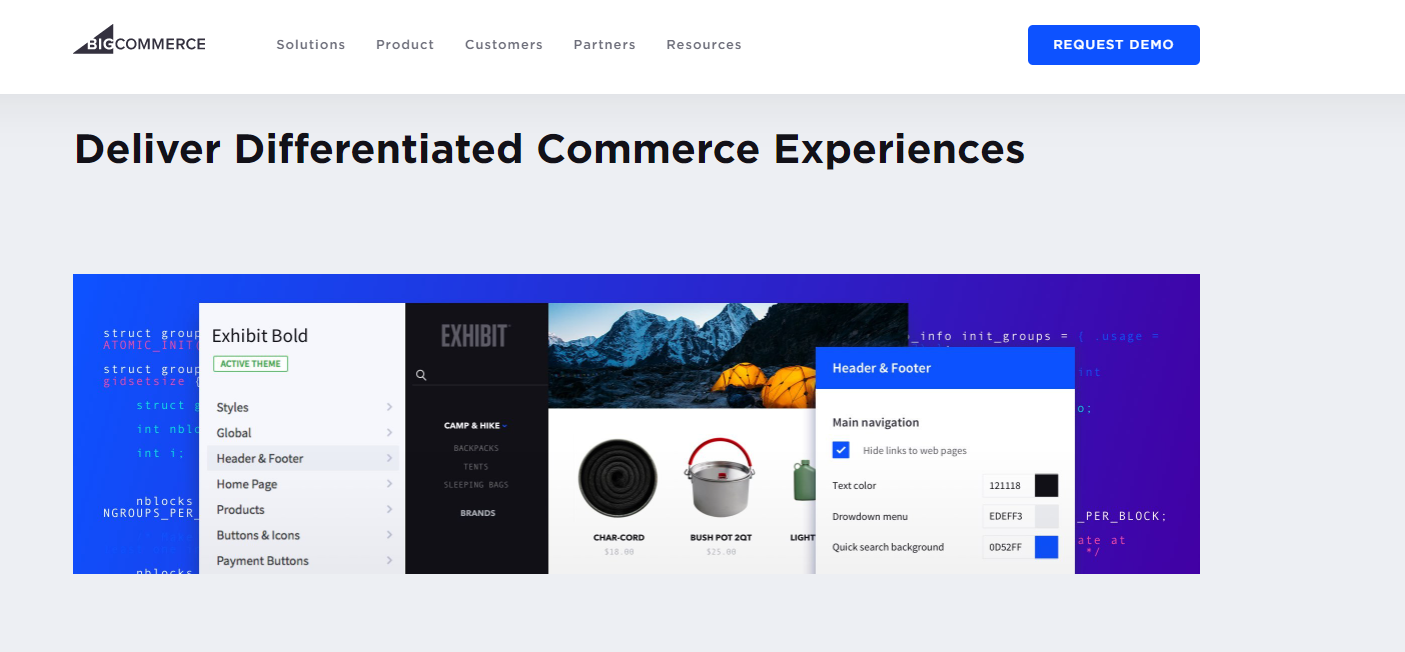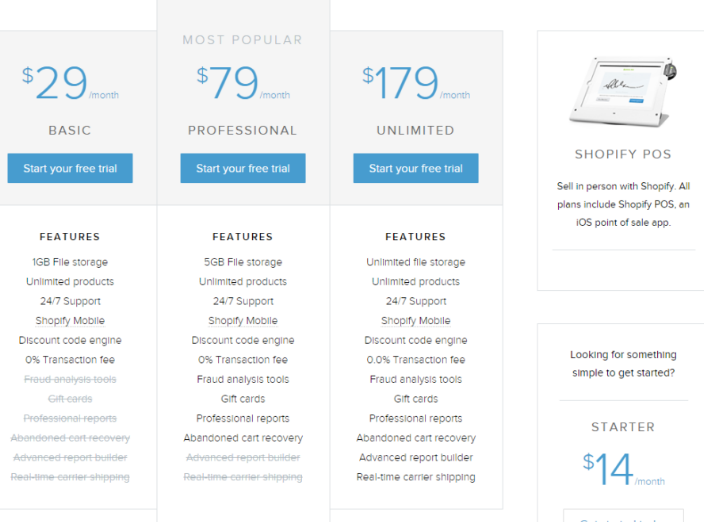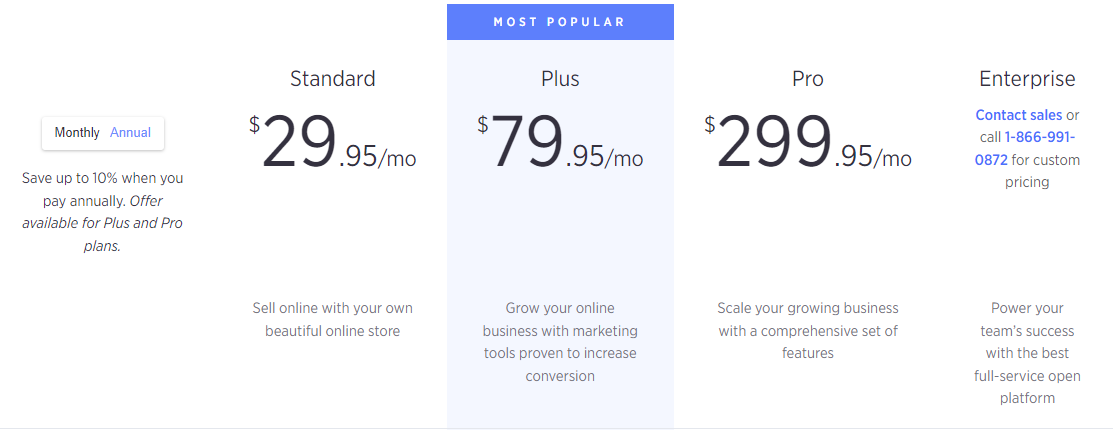BigCommerce is a comprehensive e-commerce system that enables you to create an online shop from the ground up and then manage it on an ongoing basis.
Shopify is a market leader in the e-commerce industry. It’s a comprehensive solution that enables you to create a functional e-commerce business without any coding or website development knowledge.
Bigcommerce enables you to build blog entries and pages and integrate them into your overall website.Additionally, it provides access to a comprehensive collection of tools that you may need along the route.
BigCommerce Check out
Check out
|
Shopify Check out
Check out
|
|---|---|
| 29 | 29 |
Bigcommerce takes pride in maintaining an average uptime of 99.99 percent and complete availability throughout cyber week |
Shopify is a market leader in the e-commerce industry |
|
|
|
|
|
|
|
BigCommerce a heavier platform to manage, this is due to the platform's rich built-in capabilities, which allow for a finer degree of customization |
Shopify outperforms BigCommerce in terms of simplicity of use. The majority of consumers compliment Shopify's onboarding experience and a user-friendly editor. |
|
BigCommerce price is determined by the amount of revenue generated each year. As your company expands, our platform will automatically increase your subscription package. |
Shopify includes the abandoned cart recovery option in the Basic Plan which might be a significant benefit for you. |
|
With BigCommerce, you'll have access to support 24 hours a day, seven days a week by phone, live chat, or email. Before gaining access to an email address or phone number, you will be prompted to complete a form and examine. |
Shopify's help is available 24 hours a day, and it also requires you to discover DIY answers to your problems before providing you with any genuine contact information. |
| Check out | Check out |
If you’re intending to build an eCommerce business, you’ll soon have to confront a severe dilemma: BigCommerce versus Shopify – which one should you choose?
While both BigCommerce, as well as Shopify, are amazing in their own right, there are significant distinctions that make each platform more suited for various circumstances and kinds of users.
Today, we get to the bottom of this and evaluate BigCommerce versus Shopify head to head.
We look at their features, cost, design choices, the convenience of use – essentially, anything that a person who’s intending to create an eCommerce business would want to know.
BigCommerce Vs Shopify 2025 – Comparison of eCommerce Platfrom!
What is BigCommerce and What Makes it Different?
Similar to Shopify, BigCommerce is a comprehensive e-commerce system that enables you to create an online shop from the ground up and then manage it on an ongoing basis. Additionally, it provides access to a comprehensive collection of tools that you may need along the route.
While BigCommerce is suitable for enterprises that are new to e-commerce, you’ll get the most out of it if you’re already a fast-growing brand or a high-volume firm.
According to Ipsos data, Bigcommerce merchants expand 28 percent year over year, over double the industry average.
Additionally, Bigcommerce takes pride in maintaining an average uptime of 99.99 percent and complete availability throughout Cyber Week.
The control panel is comparable to Shopify’s. The primary dashboard contains information about your latest orders, site traffic, and income, among other things.
Apart from e-commerce, Bigcommerce enables you to build blog entries and pages and integrate them into your overall website. In other words, it enables you to create a website that is more than simply an e-commerce platform.
Finally, you have access to marketing tools like discounts, search marketing campaigns, and transactional emails.
In general, BigCommerce seems to be more geared toward companies who are already up and running and generating revenue, or at the very least have a solid strategy for doing so. Having said that, you will not be missing out on anything if you are a total newbie as well.
What is Shopify and What Makes it Different?
Shopify is a market leader in the e-commerce industry. It’s a comprehensive solution that enables you to create a functional e-commerce business without any coding or website development knowledge.
Finally, Shopify may be utilized by anybody who needs an e-commerce business but does not want to engage someone to do so.
Shopify is also one of the most user-friendly such systems available. Its primary selling point is that it is designed for novices, assisting them in a variety of ways.
What further distinguishes Shopify is the plethora of other tools that come as a bonus. Among these is their POS (point of sale) system, which enables you to accept payments almost anywhere (be it your brick-and-mortar store, a trade show, even a one-on-one meeting).
This is a rather unusual method of connecting your online e-commerce company to the physical world, and it certainly opens up a lot of possibilities.
Then there are Shopify’s excellent assistance features, which are not well marketed but may be a huge time-saving. Essentially, Shopify saves you time and effort, especially in the more mundane aspects of the business.
However, when it comes to the critical areas (such as delivering a fantastic shopping experience for your clients), Shopify provides you a lot of creative flexibility while still optimizing everything.
BigCommerce Vs Shopify: Customer Service
If you want to maximize your eCommerce shop development experience, you must go beyond price plans and delivery costs.
While it’s important to locate solutions with a price structure that fits your company, it’s equally critical that your SaaS solution is simple to use and comes with the appropriate support.
Whether you’re having difficulty calculating shipping rates or want to change from a simple Shopify plan to a more complex one, you’re going to need a dependable customer care staff.
Both Shopify and BigCommerce provide a comparable range of support services, including live chat, forum communities, FAQ sites, and even email help. Additionally, you may contact customer service by phone.
With BigCommerce, you’ll have access to support 24 hours a day, seven days a week by phone, live chat, or email. Before gaining access to an email address or phone number, you will be prompted to complete a form and examine any DIY ideas available on the BigCommerce website.
There is a “skip this step” option available if you are aware that you need more assistance. On the bright side, BigCommerce offers some of the finest support in the industry, with over 90% of problems resolved on the first contact.
Shopify’s help is available 24 hours a day, and it also requires you to discover DIY answers to your problems before providing you with any genuine contact information.
Shopify’s support policy is quite ambiguous in several areas. There is phone number assistance for select countries, however, there is no guidance on who to contact if your country is not included. Despite this, many customers say that even if you’re not a fan of phone assistance, Shopify still provides exceptional customer care.
BigCommerce Vs Shopify: Mobile Applications
As the world gets more mobile, you may want to choose an eCommerce website builder that enables you to capitalize on the mobile revolution. This includes ensuring that your clients can purchase online safely while using their phones.
However, you may want to check to see whether both BigCommerce and Shopify provide mobile applications.Shopify provides greater functionality and app alternatives for managing your shops on the move in terms of mobile applications for company owners.
Shopify POS and the Shopify app are the two leading rivals. Shopify’s app enables you to handle orders and provide reports. On the other side, the Shopify POS enables you to sell actual goods through your Shopify shop.
Additionally, BigCommerce includes a mobile app that enables you to manage orders and monitor customer information on the go. However, in comparison to Shopify, the BigCommerce app is rather rudimentary.
In terms of mobile functionality, it’s worth mentioning that both Shopify and BigCommerce enable company owners to publish product pages in AMP style.
This enables you to ensure that your website pages load fast and provide an optimal user experience on mobile devices.As far as we are aware, you do not need to increase your BigCommerce price to enable AMP capability.
Additionally, you may utilize AMP technology with any of Shopify’s themes as long as the appropriate application is installed.
This kind of capability is critical for tools like BigCommerce and Shopify to differentiate themselves from competitors like Magento and Squarespace.
BigCommerce Vs Shopify: Product Management
While experimenting with your e-commerce store’s design is enjoyable, the majority of your everyday labor will focus on items and orders. Thus, let us see how Shopify and Bigcommerce approach those areas:
Adding new goods to Shopify is a breeze. Each unique aspect of the product is divided, making it simple to comprehend.
You may easily classify your items, add descriptions and photos, establish pricing, manage inventory, configure shipping charges, and even configure product variations (e.g. different sizes or colors).
Once you’ve added a few goods to your database, Shopify organizes them into a clear table where you may conduct more improvements. Additionally, there are areas for inventory management, product groupings, and gift cards.
In general, Shopify focuses on providing you with access to all the capabilities that are necessary for running your e-commerce site, while sparing you from any unnecessary or supplemental functionality.
Additionally, Bigcommerce is fairly user-friendly when it comes to adding new goods and maintaining them on the website. Having said that, their UI seems to be a little antiquated in comparison to Shopify’s.
They still have all essential and popular fields, but everything seems significantly more complicated. In general, Bigcommerce provides additional choices for adding new items and configuring different aspects of them. Shopify, on the other hand, simplifies and streamlines the procedure.
Whichever method is the superior one is up for debate, and the decision is entirely up to you depending on your needs.
BigCommerce Vs Shopify: Designs
For us, the designs provided are often what make or break the transaction. To be very honest, we want our e-commerce shop to appear fantastic. And if it does not, we will seek a platform capable of delivering a superior solution.
Therefore, let us compare the available designs in Shopify and Bigcommerce:
Shopify has a lot to offer in terms of design. There are over 100 e-commerce shop templates to pick from, with more than two-thirds of them being free.
The designs are available in Shopify’s “theme shop.” The good news is that you can filter the templates by pricing and industry, making it simpler to pick something ideal for your market.
Notably, all of the templates are mobile responsive, which means they will look amazing on all devices.
Finally, if you want to take things a step further, Shopify provides you complete control over the HTML and CSS code for your design, allowing you to make whatever changes you desire.
If you have little experience with coding or website design, you may adjust your theme using Shopify’s built-in theme editor.
It allows you to simply tweak color and font settings, add your logo, update the header, and essentially do anything else necessary to include your identity.
In general, the designs available via Shopify are well-optimized and seem to be custom-made for e-commerce shops. Add to that the ability to modify them to properly suit your brand, and you’ve got yourself a very stunning online shop.
Bigcommerce’s design collection seems to be rather smaller than Shopify’s (especially in the free department).
Additionally, not all of Bigcommerce’s themes have the Style Editor, which allows you to customize the colors and fonts of your design. Additionally, not all of them seem to be mobile-friendly.
Fortunately, you can narrow down the list of themes to those that are both free and responsive.
When it comes to modifications, you receive complete access to each theme’s HTML and CSS, allowing you to do whatever you want with them as long as you’re comfortable with those technologies.
If you lack these abilities, Bigcommerce enables you to make simple adjustments such as changing the logo, modifying the header of your site, and selecting what should be shown in the top carousel (if the theme you selected has a carousel).
In general, the designs accessible via Bigcommerce appear decent once customized… Before your business begins to appear good, you must alter the headers, the menu, and the content shown on the site, among other things.
And, please do not misunderstand, this is all quite simple to do.
It’s simply that Shopify’s solution is more user-friendly and intuitive overall. Plus, once you’ve chosen a design in Shopify, your business will look fantastic from the start. Thus, Shopify triumphs in the design stakes.
BigCommerce Vs Shopify: Ease of Use
Not just for novices, but also for seasoned eCommerce merchants, ease of use is critical.
As such, this is one issue that we’d want to address while comparing BigCommerce with Shopify.BigCommerce is less suitable for novices owing to its extensive usage of technical jargon.
Each time you execute a fundamental operation such as adding a product, you may need to look for some of the specialized phrases to ensure that you grasp all of the terminologies.
Although the technological burden makes BigCommerce a heavier platform to manage, this is due to the platform’s rich built-in capabilities, which allow for a finer degree of customization.You do not have to be a Shopify specialist to create a shop, and anybody can quickly start an online retail business within minutes.
In general, Shopify outperforms BigCommerce in terms of simplicity of use. The majority of consumers compliment Shopify’s onboarding experience and a user-friendly editor.
You can access all necessary options through the left-hand main menu, and there is a helpful wizard that guides you through the process of setting up your business.
BigCommerce Vs Shopify: Pricing
One of the first queries prospective consumers have when comparing BigCommerce vs Shopify is “How much do they cost?”
BigCommerce and Shopify both offer 30-day free trials. Additionally, they provide pricing options ranging from around $29 to $299. Both BigCommerce and Shopify provide competitive prices. BigCommerce is just $0.95 extra per month than Shopify. Consider the following.
BigCommerce price is determined by the amount of revenue generated each year. As your company expands, our platform will automatically increase your subscription package.
The distinction between BigCommerce and Shopify is primarily about the functionality included in each package.
One area where BigCommerce does have an edge is in terms of transaction costs and the unlimited staff accounts included in the Standard Plan. In comparison to Shopify, extra transaction fees and only 15 staff accounts are included in the Advanced Plan.
Although Shopify includes the abandoned cart recovery option in the Basic Plan, BigCommerce does not, which might be a significant benefit for you.
Quick Links
FAQs of BigCommerce Vs Shopify
When should you not use Shopify?
Both BigCommerce and Shopify are worth considering. However, Shopify is very pricey, making it unsuitable for people with a restricted budget for company growth
What are the main alternatives to Shopify and BigCommerce?
Squarespace, Wix, and Jimdo are all similar hosted systems. Self-hosted WordPress is also often used in combination with online commerce systems such as WooCommerce and Ecwid, although doing so efficiently typically requires development help.
Does BigCommerce have an equivalent of Shopify’s Lite Plan?
While BigCommerce does not provide a plan as inexpensive as Shopify's $9 Lite plan, you may use any BigCommerce subscription to access comparable features (i.e., the ability to sell on social media or design equivalent purchase buttons for use on other websites).
Are Shopify Payments worth it?
As a merchant, Shopify Payments provides you with the ease of a payment gateway that is customized for your eCommerce platform, all without incurring transaction costs. However, your consumers may choose to utilize a more established platform (such as PayPal) that they are already familiar with. If you're unsure, our Shopify Payments review might help
Final Verdict 2025 – Which One Out of BigCommerce or Shopify is Better?
Is there an obvious winner in the BigCommerce vs Shopify comparison?
The fantastic news is that there is no incorrect decision between Shopify and BigCommerce. Both systems have comparable cost and feature sets.
However, the devil is in the details, and it all relies on how you choose to provide those features.
Shopify’s third-party ecosystem is somewhat more established. When you choose Shopify, you have access to a more vibrant community of designers, developers, and freelancers that are familiar with the platform (who will be ready to offer you help).
Additionally, it is a bit more beginner-friendly platform, particularly if this is your first-time self-hosting an eCommerce business.
On the other side, BigCommerce provides some wonderful advanced capabilities out of the box without requiring you to visit the app store and purchase upgrades.
If you are a user who wishes to customize your shop on a more detailed level, BigCommerce may be the right alternative for you.Since we launched ecommerce-platforms.com in 2012, we’ve been living and breathing eCommerce.
We’ve evaluated dozens of various eCommerce tools and solutions over the years, providing us with an in-depth understanding of what’s available and what people are most likely to connect with.
Finally, we’d describe this BigCommerce versus Shopify debate as follows –
Shopify is ideal for businesses that are just getting started and want a platform that is easy to use, has a low learning curve and a basic structure but is also robust enough to provide all the functionality you could need.
If you’re not scared to continue experimenting with your eCommerce platform and are unconcerned with the learning curve… Shopify is still in use.
Surprising? The truth is, although BigCommerce is an excellent alternative to Shopify, we just cannot ignore the fact that Shopify is nearly 8x more popular. Can all of those users be incorrect?
Additionally, both systems provide free trials, so if you’re not sold on Shopify after two weeks, you can simply switch to BigCommerce without incurring any costs.









